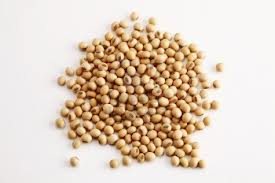 Soybeans, also known as soya beans, are a type of legume native to East Asia. Soy beans are perhaps the most widely cultivated bean on the planet, known for feeding both humans and animals. Known as a low fat bean which is high in protein, soy beans can produce more protein per acre than any other legume. While fresh soybeans are widely consumed, soy derivatives are much more popular around the globe. A few examples of soy based foods include tofu, soy milk, soy sauce, fermented bean paste, natto and tempeh. The largest producer of soy on the plant is the United States followed by Argentina, Brazil, China and India.
Soybeans, also known as soya beans, are a type of legume native to East Asia. Soy beans are perhaps the most widely cultivated bean on the planet, known for feeding both humans and animals. Known as a low fat bean which is high in protein, soy beans can produce more protein per acre than any other legume. While fresh soybeans are widely consumed, soy derivatives are much more popular around the globe. A few examples of soy based foods include tofu, soy milk, soy sauce, fermented bean paste, natto and tempeh. The largest producer of soy on the plant is the United States followed by Argentina, Brazil, China and India.
Key Nutrients
Soy beans provides all the essential amino acids including Histidine, Isoleucine, Leucine, Lysine, Methionine, Phenylalanine, Threonine, Tryptophan and Valine. It is also a great source of iron, calcium and unsaturated fatty acids.
Health Benefits
Dietary Fiber – Dietary Fiber stimulates digestion and peristalsis, helping to relieve indigestion and constipation problems.
Protein provides the building blocks needed for cellular growth. It also provides the body with an important energy source.
Sodium is an important mineral needed for cellular function, and positively benefits neural function.
Iron –Iron, found in red blood cells, is an integral part of hemoglobin. Hemoglobin carries oxygen from the lungs to the cells. Iron is an essential component of many enzymes necessary for various chemical reactions in the body.
Calcium – Calcium is an important mineral for bone and teeth growth and maintenance. It is also an important mineral in terms of cardiovascular function.
Season
Soybeans, while grown during the summer months, can be found dried or canned year round in supermarkets and food retail shops.
Nutrition Information
Per ½ Cup (128 grams):
Calories (cKal): 188
Protein (grams): 16.58
Total Fat (grams): 8.7
Carbohydrates (grams): 14.14
Fiber (grams): 5.4
Buying and Storing
When buying fresh soybeans, make sure the beans are bright green in color and free of blemishes and wilting. When buying dry soy beans, make sure the beans are free of pebbles and stones. Fresh soy beans can store in your refrigerator for up to one week, while dry soy beans can be stored for up to one year.
Best Way to Add to Diet
Soybeans can be enjoyed fresh or cooked in a bit of boiling water. Add soybeans to your favorite salad for a unique taste and texture. Roasted soybeans make a great addition to any breakfast cereal or trail mix.
Soybean Recipe
Soy Beans with Shaved Almonds and Lemon Zest

 Not Sure What Healthy Foods To Eat?
Not Sure What Healthy Foods To Eat? This week we take a look at one of my favorite healthy foods...the mighty Avocado.
This week we take a look at one of my favorite healthy foods...the mighty Avocado.
No comments yet.